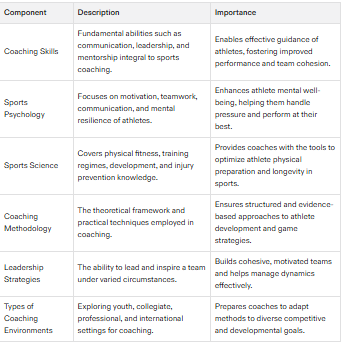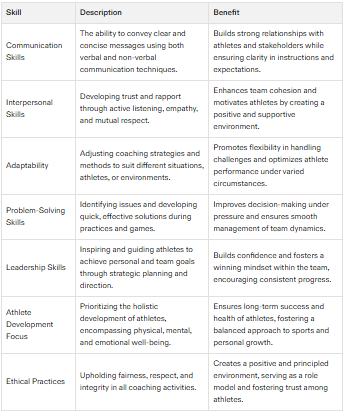Sports Coach Course
Top Sports Coach Course: Essential Skills for Aspiring Coaches
Understanding the Fundamentals of Sports Coaching
Learn the key principles of sports coaching, including coaching skills, coaching methodology, sports administration, and leadership strategies.
Understand the importance of sports psychology in coaching, including motivation, teamwork, and communication.
Discover the role of sports science in coaching, including physical fitness, athlete development, and injury prevention.
Explore the different types of coaching, including youth, collegiate, professional, and international team settings.
Develop a comprehensive understanding of coaching principles and techniques.
Key Skills for Effective Coaches
Develop strong communication and interpersonal skills to effectively interact with athletes, coaches, and other stakeholders.
Learn how to create a positive and supportive team culture, including building trust, setting goals, and providing feedback.
Understand the importance of adaptability and flexibility in coaching, including adjusting to different situations and environments.
Develop strong problem-solving and decision-making skills to effectively manage games and practices.
Learn how to prioritize athlete development and well-being, including physical and mental health. Ethical practices are essential to empower and motivate athletes while maintaining a strong ethical foundation to positively influence the sports environment.
Communication and Leadership Skills
Effective communication and leadership skills are the backbone of successful sports coaching. As a coach, your ability to convey clear and concise messages to athletes, colleagues, and other stakeholders is paramount. This encompasses both verbal and non-verbal communication, active listening, and adept conflict resolution. Leadership skills, such as decision-making, problem-solving, and motivation, are equally critical. These skills enable coaches to inspire and guide their athletes towards achieving their full potential.
To hone these skills, sports coaches can engage in various educational and training programs. Many sports coaching courses, such as the Diploma in Sports Coaching, offer specialized modules focusing on communication and leadership. Additionally, learning from seasoned coaches and mentors, attending workshops and conferences, and participating in online forums can significantly enhance these essential skills.
Safety and Injury Prevention in Sports
Understand the importance of safety and injury prevention in sports, including risk management and emergency response.
Learn how to create a safe and healthy training environment, including equipment maintenance and facility management.
Develop strategies for preventing injuries, including warm-up and cool-down exercises, stretching, and strengthening.
Understand the role of sports medicine in coaching, including injury diagnosis and treatment.
Learn how to respond to emergencies, including first aid and CPR.
Psychological Aspects of Coaching
Understanding the psychological aspects of coaching is crucial for fostering athlete development and success. Coaches must grasp the psychological factors that influence performance, motivation, and overall well-being. This includes principles of sports psychology like goal-setting, self-efficacy, and emotional regulation. Creating a positive and supportive team culture is also vital, as it nurtures athlete development and success.
Aspiring coaches can deepen their knowledge of sports psychology through dedicated education and training programs. For instance, the MA Sport Coaching (Online) program offers comprehensive courses on the psychological aspects of coaching, covering topics such as athlete development and team leadership. Additionally, learning from experienced coaches and sports psychologists, attending relevant workshops and conferences, and engaging in online discussions can further enhance a coach’s psychological acumen.
Choosing the Right Coaching Course
Research different coaching courses and programs, including online and in-person options.
Consider factors such as cost, duration, and accreditation when selecting a course.
Look for courses that align with your coaching goals and interests, including sport-specific and general coaching courses.
Read reviews and testimonials from past students to get a sense of the course quality and effectiveness.
Check for certification and recognition from reputable organizations, such as the National Strength and Conditioning Association.
Technology in Sports Coaching
In the modern era, technology plays an increasingly pivotal role in sports coaching. Utilizing tools such as video analysis software, GPS tracking devices, and mobile apps, coaches can analyze athlete performance, monitor progress, and provide precise feedback. Technology also facilitates enhanced communication and collaboration between coaches, athletes, and other stakeholders, contributing to a more efficient and effective coaching process.
To stay abreast of technological advancements, coaches can participate in various education and training programs, including online courses and workshops. Learning from experienced coaches and technology experts, attending conferences and trade shows, and engaging in online forums are excellent ways to keep up-to-date with the latest technological tools and techniques in sports coaching.
By integrating these new sections, the article will provide a comprehensive guide for aspiring sports coaches, covering essential skills, psychological insights, and the latest technological advancements in the field.
Building a Successful Coaching Career
Develop a strong network of contacts, including coaches, athletes, and other stakeholders.
Create a professional online presence, including a website and social media profiles.
Learn how to market yourself and your coaching services, including creating a personal brand and promoting your expertise.
Develop a business plan, including setting goals, creating a budget, and establishing a pricing structure.
Consider obtaining certification or licensure to demonstrate your expertise and commitment to coaching.
Launching Your Career as a Sports Coach
Create a job search strategy, including networking, job boards, and social media.
Develop a strong resume and cover letter, highlighting your coaching experience and education.
Prepare for job interviews, including researching the organization and practicing common coaching interview questions.
Learn how to negotiate salary and benefits, including understanding the market rate and advocating for yourself.
Consider starting as an assistant coach or volunteer to gain experience and build your network.





